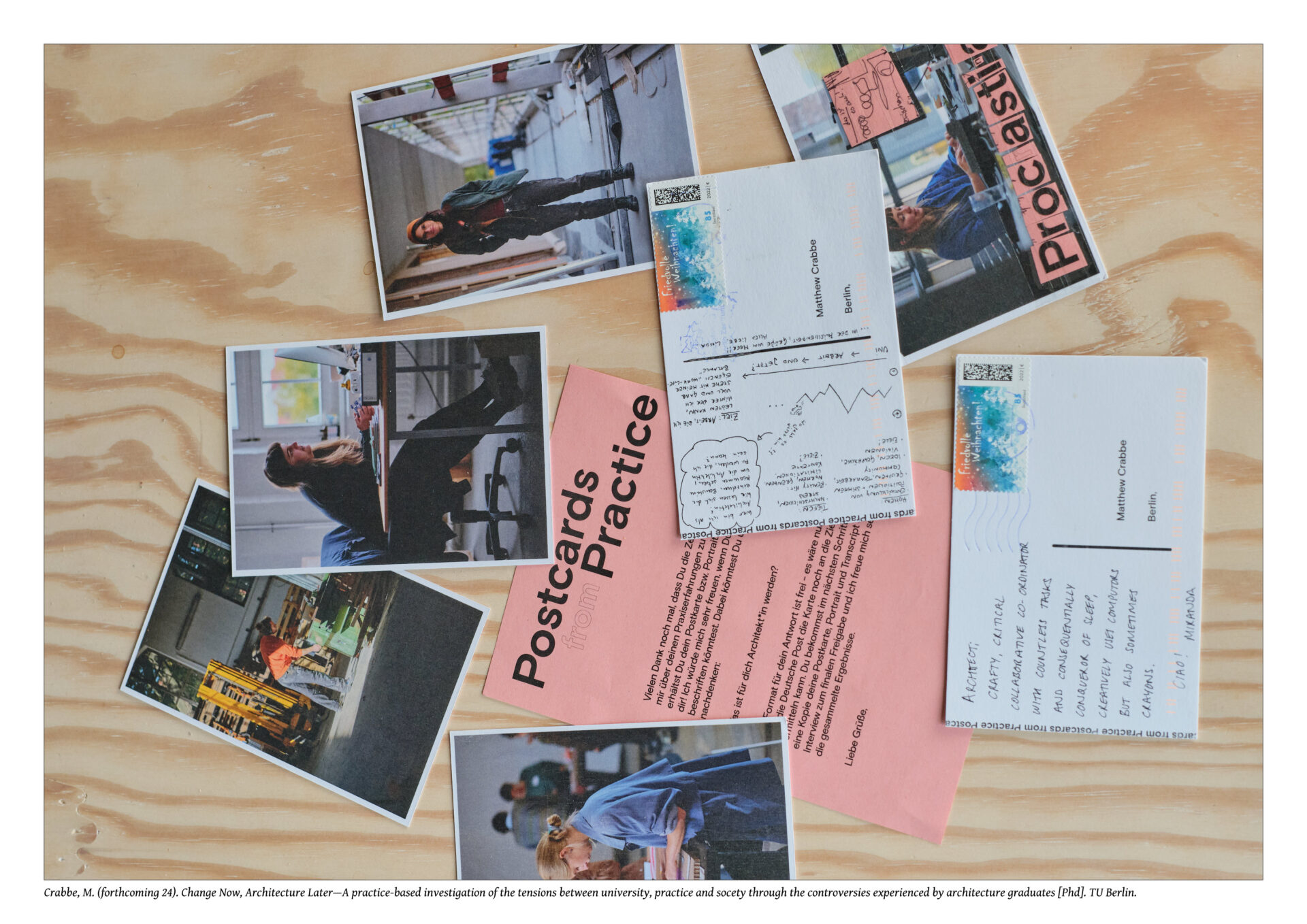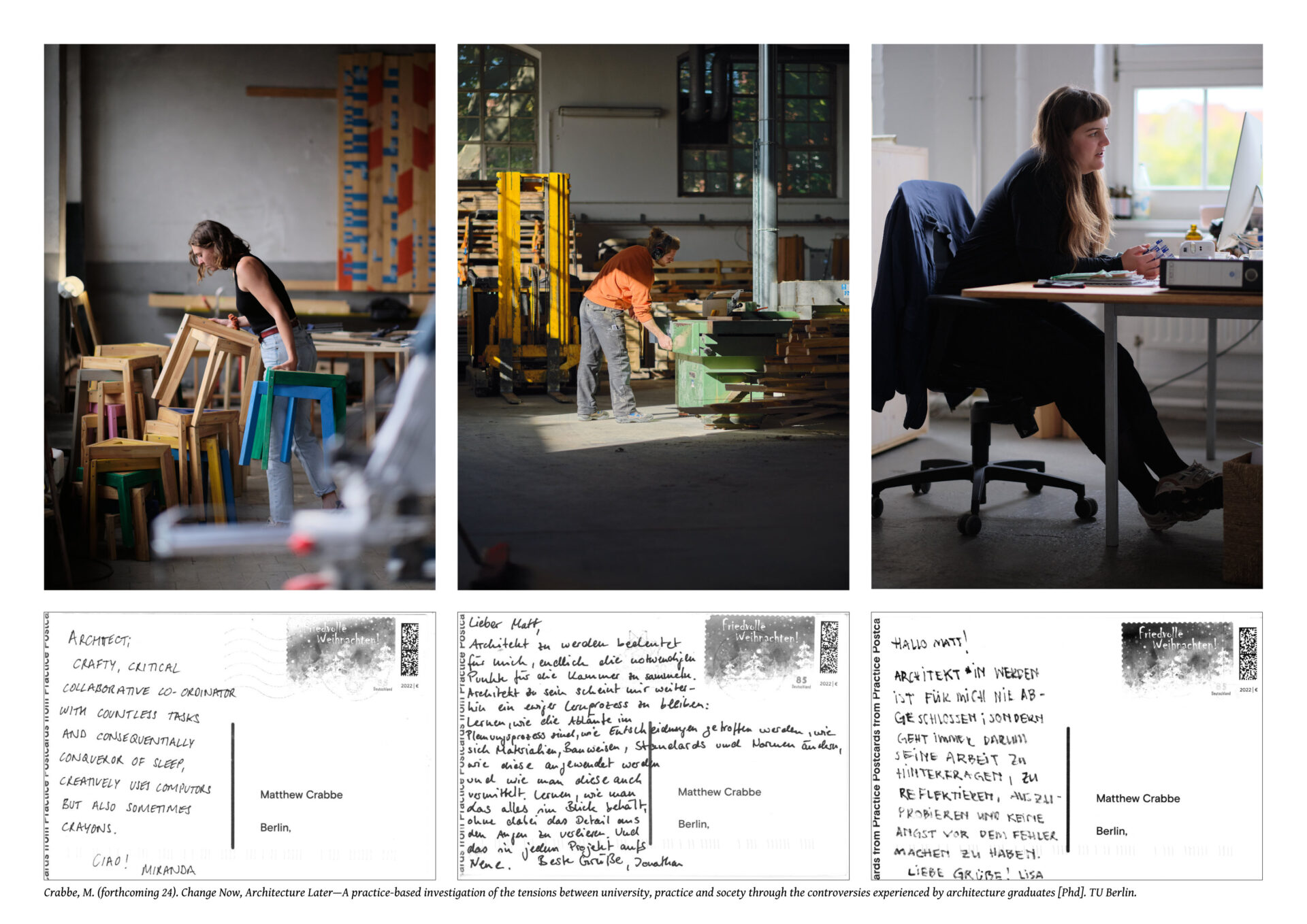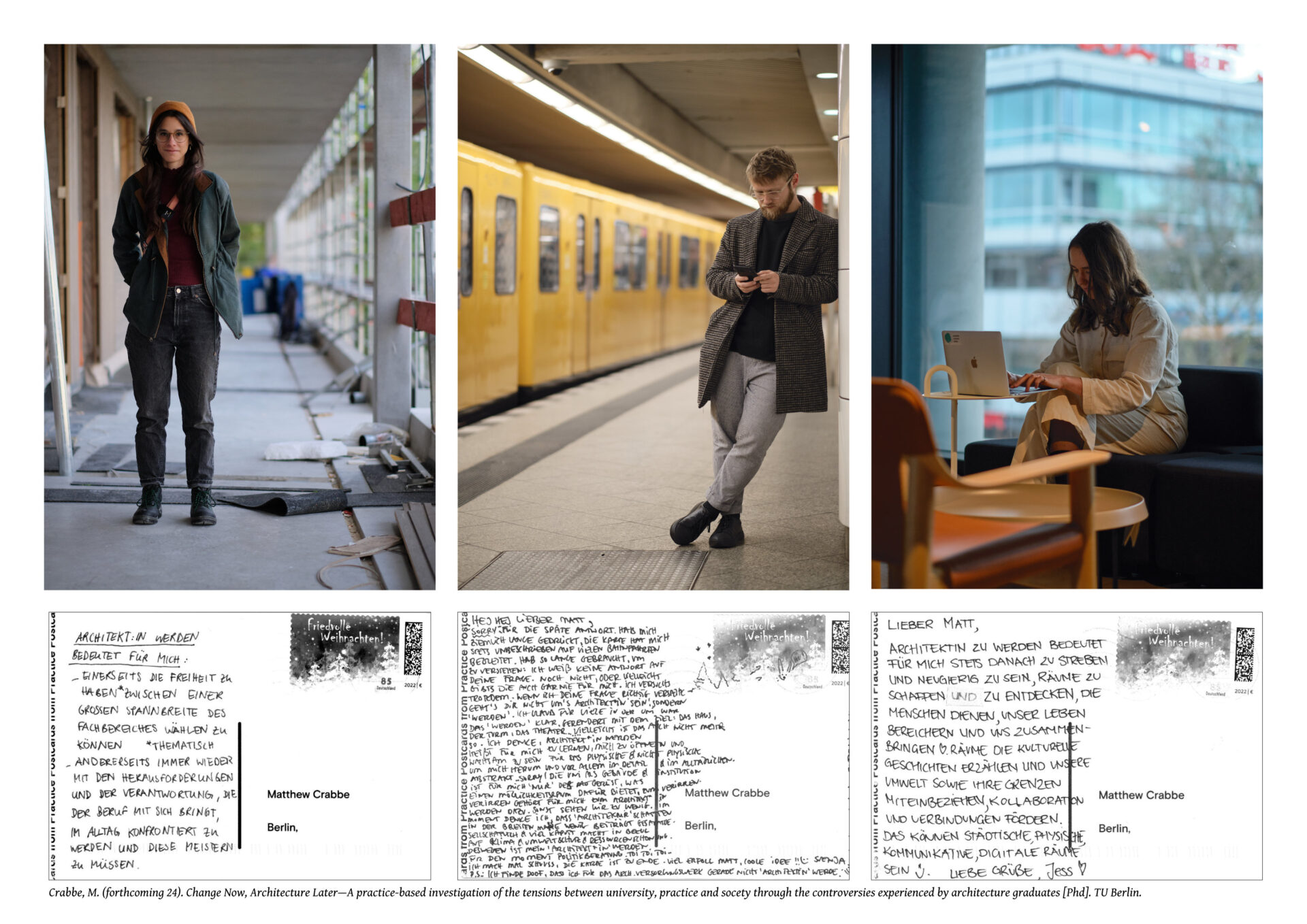CHANGE NOW, ARCHITECTURE LATER!
a practice-based exploration of the controversies between university, profession and society that underlie becoming an architect in Climate Breakdown
Supervisor: Eike Roswag-Klinge, TU Berlin
Second Assessor: Prof. Jane Anderson, Oxford Brookes University
All contents © Matthew Crabbe
Matt’s PhD Dissertation “Change Now Architecture Later!” is a contribution to the study of architects and their motivations. It provides an insider perspective on the challenges faced by today’s graduates becoming architects in Climate Breakdown.
Becoming an architect has always required graduates to bridge the practice gap, a disconnect stemming from the stark and longstanding differences between the expectations of being an architect raised by universities, the architectural press and public perception, and the reality encountered in much of professional practice. However, today’s architecture graduates are entering a field characterised by rising tensions, shifting narratives and seemingly intractable professional challenges in which Climate Breakdown is creating new ways of ordering the architecture profession’s past, present, and future — and the next generation’s role within it. The thesis asks: how big is the gap between how graduates want architecture practice to be and the reality they encounter? How do conflicting demands of university, profession and society create this practice gap? How does Climate Breakdown necessitate a fresh appraisal of these already fraught relationships?
The longitudinal study focuses on nine architecture graduates, two to five years after graduating from the Technische Universität Berlin. This group comprises diverse perspectives, including a civil servant, a journalist, graduates working in architecture offices, a collective, and two start-ups. The practice-based research design oscillates between “Chapters” providing context, methods and theory, and “Tasks” which deploy diverse methods such as interviews, portrait photography and narrative inquiry, often thematising the tacit knowledge and assumptions of researcher, participants and reader. These methods show how graduates perceive architecture as part of a dynamic professional “self-understanding” reflecting their life politics and career ambitions. Exploring the practice gap reveals a series of controversies surrounding climate, societal role, labour issues and generational attitudes to work that lead the graduates to question their motivation to practice architecture. For some of the interviewees, transcending these challenges has resulted in them pursuing careers outside conventional architecture practice.
The research reinterprets the practice gap as a dynamic mechanism that shapes the interaction between university and practice through the agency of graduates. Climate Breakdown offers them a lens through which to scrutinise the root causes and effects of longstanding professional crises, revealing their structural entanglements in extractive and exploitative ways of thinking and doing architecture. However, the difficulty that graduates in non-typical careers face in disentangling their identity as architects from traditional role models and stereotypes demonstrates that the profession is not receptive enough to the new perspectives that could help diversify the profession’s knowledge base and provide a way to overcome the longstanding “job/calling” binary through a new social and ecological definition of what it means to be an architect in a rapidly changing world.



Key Literature
- Barosio, M. et al. (2024) Architecture’s afterlife: the multisector impact of an architecture degree. London New York: Routledge.
- Cuff, D. (1992) Architecture: the story of practice. 2. print. Cambridge, Mass. u.a.: MIT Press.
- Deamer, P. (2020) Architecture and Labor. Routledge.
- Giddens, A. (1991) Modernity and self-identity: self and society in the late modern age. Reprint. Cambridge: Polity Press.
- Harriss, H. et al. (2022) Architectures Afterlive – Final Report. Available at: http://architectures-afterlife.com/files/file/outputs/IO2_ARCHITECTURES-AFTERLIFE-REPORTS-BOOK-1.pdf (Accessed: 22 November 2023).
- Harriss, H., Hyde, R. and Marcaccio, R. (eds) (2020) Architects after architecture: alternative pathways for practice. New York, NY: Routledge.
- Hartmann, K. (2022) Black Turtleneck, Round Glasses: Expanding Planning Culture Perspectives. JOVIS. Available at: https://doi.org/10.1515/9783868599893.
- James, S. (2017) Making a Living, Making a Life: Work, Meaning and Self-Identity. London: Routledge. Available at: https://doi.org/10.4324/9781315593241.
- Latour, B. (2007) Reassembling the social: an introduction to Actor-Network-Theory. 1. publ. in pbk. Oxford: Oxford Univ. Press (Clarendon lectures in management studies).
- Samuel, F. (2018) Why architects matter: evidencing and communicating the value of architects. New York: Routledge.
- Starker, V. and Hoppe, J. (2024) New Work in der Architektur. Rossberg. Available at: https://rossberg-verlag.de/rossberg (Accessed: 29 January 2024).
- Susskind, R.E. and Susskind, D. (2022) The future of the professions: how technology will transform the work of human experts. Updated edition. Oxford, United Kingdom: Oxford University Press. Available at: https://webreader.mytolino.com/library/.
- Terkel, S. (ed.) (1977) Working: people talk about what they do all day and how they feel about what they do. Harmondsworth: Penguin Books (A Peregrine book).
- Thompson, J. (2019) Narratives of architectural education: from student to architect. Abingdon, Oxon ; New York: Routledge/Taylor and Francis Group (Routledge research in architecture).
- Ziemer, G. (2013) Komplizenschaft: neue Perspektiven auf Kollektivität. Bielefeld: Transcript (X-Texte).
Participants: Maire Cordts, Reingard Hesse, Leon Klaßen, Max Pfeffer, Lukas Wichmann
